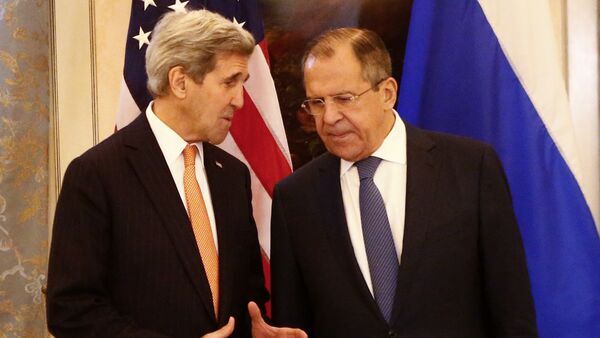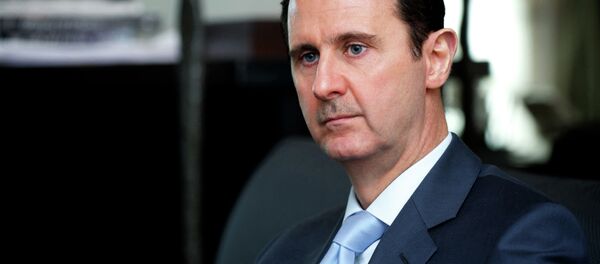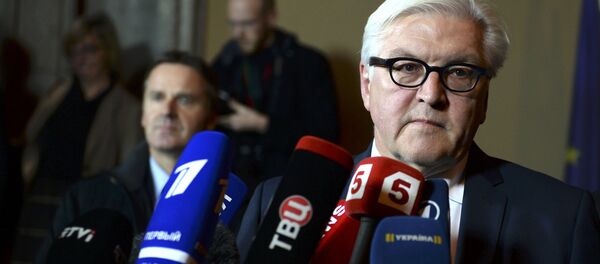Mediators at the Vienna talks on Syrian peace appear to have a growing understanding that a unified and inclusive coalition is needed to roll back Islamic State (ISIL) extremism, Russian Foreign Minister Sergei Lavrov said Saturday.
"I have a feeling that the need to create an efficient, comprehensive, international coalition against IS and other terrorist groups is becoming more and more apparent," the top Russian diplomat told reporters after the Vienna talks.
The ministerial-level negotiations were overshadowed by a string of gruesome terrorist attacks in Paris that claimed 127 lives on Friday night.
"It is crystal clear to me that yesterday’s atrocities in Paris is enough to convince even the staunchest skeptics that terrorism cannot be justified, neither can we justify our inertia in the fight against this evil," Lavrov stressed.
Sergei Lavrov also said that the Syrian government and the opposition should agree within six months on the establishment of the National unity government.
The French president described the deadly assault as barbaric and an act of war masterminded by the ISIL militant group. France has been launching airstrikes against ISIL targets in Syria since September as part of a US-led international coalition of Western and Arab states.
The negotiators involved in the talks are united in their efforts to combat terrorism and maintain peace and stability worldwide, US Secretary of State John Kerry said.
US Secretary of State John Kerry added that all the parties to Syrian conflict must adhere to ceasefire, and the countries which are supporting the Syrian conflicting sides should contribute to the ceasefire taking hold.
Earlier in the day, a fresh round of international talks on Syrian reconciliation, which involve Russia, the United States and Iran, among others, were held in the Austrian capital. The negotiations were overshadowed by a series of brutal attacks that killed at least 127 people in the French capital.
"We agreed to eliminate extremist groups from the earth. And make no mistake that it will go even stronger as a result of this unspeakable brutality… [We] join our efforts today in Vienna and frankly every day in our pursuit for reconciliation and peace," Kerry said.
US Secretary of State said that mediators at the Syrian peace talks in Vienna were unable to bridge all differences on political reconciliation in Syria, including on the future of its President Bashar Assad.
Obviously, those who met in Vienna today, the support group, didn't agree on all the issues when it comes to Syria," Kerry said.
Dozens of foreign policy chiefs from world and regional powers, including the United States, Russia, and EU nations, met in the Austrian capital to discuss political transition in Syria. The question of what role Assad should play in the peace process has divided negotiators. Russia has been arguing it is for Syrian people to decide.
The elections in conflict torn-Syria are expected to be held within 18 months following the process of political transition, according to John Kerry.
"We agreed on the steps outlined in the 2012 Geneva communique to present a best path forward towards a Syrian-led political transition process within a target of 6 months. That will establish credible inclusive and nonsectarian government, will set a schedule and a process for drafting a new constitution. We also agree that free and fair elections will be held within 18 months," Kerry said.
Jordan was tasked with coordinating efforts to compile the blacklist of Syrian terrorist groups, according to Russia's Foreign Minister.
The sides participating in multilateral talks on Syrian settlement in Vienna confirmed that the country's future, as well as the future of President Bashar Assad must be decided by Syrian people, Russian Foreign Minister Sergei Lavrov said Saturday.
"We confirmed that Syrian people will decide Syria's future. This also concerns the future of President Assad and the future of any other politician in the country," Lavrov said at a press conference.
A joint statement on Syria adopted in Vienna:
"The group agreed to support and work to implement a nationwide ceasefire in Syria to come into effect as soon as the representatives of the Syrian government and the opposition have begun initial steps towards the transition under UN auspices on the basis of the Geneva Communique," the statement read. "Regarding the fight against terrorism <…>, Daesh, Nusra, and other terrorist groups <…> must be defeated."
The meeting was held between the International Syria Suppport Group, the Arab League, China, Egypt, the EU, France, Germany, Iran, Iraq, Italy, Jordan, Lebanon, Oman, Quatar, Russia, Saudi Arabia, Turkey, United Arab Emirates, the United Kingdom, the United njations, and the United States.



